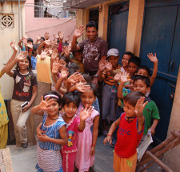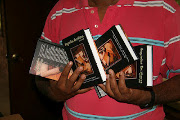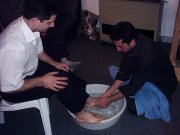Founder of ASSIST Ministries
KHUSHPUR, PUNJAB, PAKISTAN (ANS) -- Friday (March 2, 2012) marks the first anniversary of the brutal killing of Shahbaz Bhatti, Pakistan’s Federal Minister for Minorities Affairs, who was shot by Islamist extremists on March 2, 2011 for his opposition to the country’s blasphemy laws and his support of a Christian blasphemy defendant, Asia Bibi.
 |
Shahbaz Bhatti in Washington in February 2011. He gained the respect of world leaders (Photo: Jewel Samad/AFP/Getty) |
“This will be followed a few days later by another event in Islamabad and attendees are expected to include political colleagues and members of the diplomatic community, with whom Bhatti had forged close links. Pakistani Christians in the UK and around the world are also marking the anniversary,” said a spokesperson for CSW.
Mervyn Thomas, Christian Solidarity Worldwide (CSW) Chief Executive said, “We pay tribute to our friend Shahbaz, whom we miss dearly, and our thoughts and prayers are with his family and friends at this time. We continue to draw inspiration from his commitment both as a grassroots activist and a politician, not to mention his faith. He was utterly committed to making justice and equality a reality in the lives of Pakistan’s minorities.”
Bhatti’s killers are yet to be caught, and announcements from the investigative team have thus far been overshadowed by inconsistency and speculation, including in the most recent arrests in February. Bhatti’s long-term friends and associates at the All Pakistan Minorities Alliance (APMA), which he co-founded in 2002, are recommending that all memorial events should highlight the lack of progress in the hunt for his killers, stating that “a mockery has been made of the investigation”.
 |
The funeral for Shahbaz Bhatti was held in his remote village; still, 20,000 Christians came and showered rose petals on his coffin. |
Mervyn Thomas added, “It is crucial that his murder investigation reaches a satisfactory conclusion, not only to do justice and honour the memory of Shahbaz himself, but also to make it clear that the rule of law still means something in Pakistan. At stake is the ability and willingness of the Pakistani state to stand up against those taking justice into their own hands, including those who target religious minorities with confidence that they will never be held to account.”
Note: Christian Solidarity Worldwide (CSW) is a Christian organization working for religious freedom through advocacy and human rights, in the pursuit of justice.
For further information or to arrange interviews please contact Kiri Kankhwende, Press Officer at Christian Solidarity Worldwide on +44 20 8329 0045 / +44 78 2332 9663, email kiri@csw.org.uk or visit www.csw.org.uk.
Notes to Editors:
1. CSW’s briefing -- Pakistan: Religious freedom in the shadow of extremism, examines how rising religious extremism in Pakistan has catapulted some of the country’s primary religious freedom concerns into the public consciousness, in a context relevant to Pakistanis of all faiths; two examples of this have been the assassinations of prominent politicians Shahbaz Bhatti and Salmaan Taseer for their opposition to the country’s blasphemy laws.
2. Although a candlelit procession and vigil will be held in Islamabad today, the main memorial event was not scheduled for the day of the anniversary because it coincides with Pakistan’s Senate elections. This round of elections will be the first to include four seats for religious minorities, one from each province, a measure secured by Shahbaz Bhatti while he was minister.
3. For further details about the life of Shahbaz Bhatti, see his obituary (www.guardian.co.uk/world/2011/mar/10/shahbaz-bhatti-obituary) written by CSW’s Annabelle Bentham.
| Dan Wooding, 71, is an award winning British journalist now living in Southern California with his wife Norma, to whom he has been married for 48 years. They have two sons, Andrew and Peter, and six grandchildren who all live in the UK. He is the founder and international director of ASSIST (Aid to Special Saints in Strategic Times) and the ASSIST News Service (ANS) and was, for ten years, a commentator, on the UPI Radio Network in Washington, DC. He now hosts the weekly “Front Page Radio” show on KWVE in Southern California which is also carried throughout the United States. The program is also aired in Great Britain on Calvary Chapel Radio UK and also in Belize and South Africa. Besides this, Wooding is a host for His Channel Live, which is carried via the Internet to some 192 countries and also provides a regular commentary for Worship Life Radio on KWVE. You can follow Dan Wooding on Facebook under his name there or at ASSIST News Service. Dan has recently received two top media awards -- the Passion for the Persecuted award from Open Doors US, and one of the top "Newsmakers of 2011" from Plain Trust magazine. He is the author of some 44 books, one of which is his autobiography, “From Tabloid to Truth”, which is published by Theatron Books. To order a copy, press this link. Wooding, who was born in Nigeria of British missionary parents, has also recently released his first novel “Red Dagger” which is available this link. |  |
** You may republish this story with proper attribution.


_1217_-_indonesia-christmas-security.jpg)








